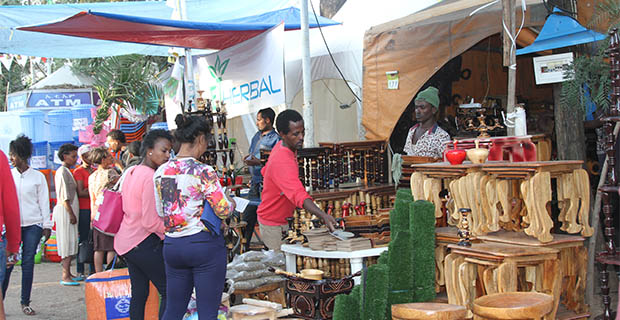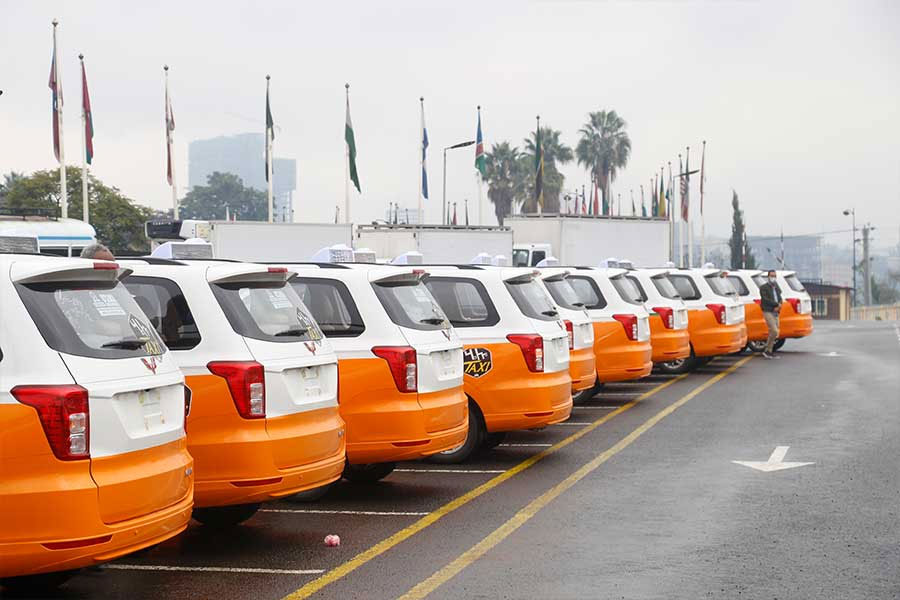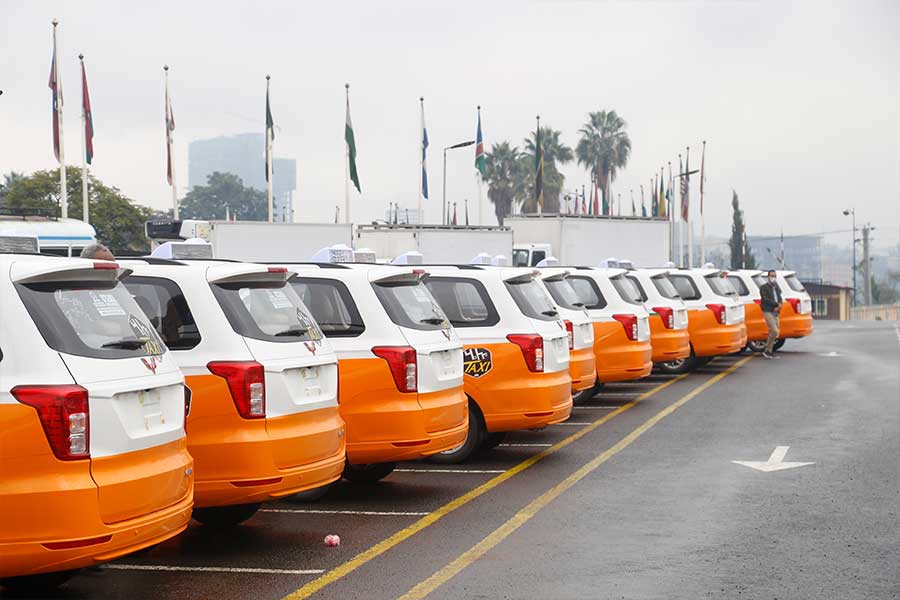
Radar | Jan 05,2020
To say that the rise in popularity of meter-taxi and ride-hailing services in recent years has disrupted the traditional cab-hailing industry is an understatement. Drivers of the long-serving Lada taxis have been experiencing a devastating decline in business as Addis Abeba's residents increasingly looked to services from the taxi-hailing companies to meet their transportation needs over the past few years.
As these tech-based taxi services gained more and more ground, Lada taxi drivers found themselves marginalised, with their slice of the pie growing thinner by the day. Many of these drivers are still around, trying to make the best of a bleak situation. In contrast, others have given up their blue-taxi trade in favour of signing up with their seemingly victorious competitors.
Mikias Meressa, who used to earn a living driving the signature blue taxi, was no exception to the struggle. Hoping to seize the opportunity to acquire a better and more modern car, he struck a deal with O'clock General Motors and many of his peers. The opportunity in question presented itself three years ago when O'clock General offered 65 Lada taxi owners' associations a chance to purchase new cars through loan schemes.
Mikias was a member of one of the associations whose members made a downpayment of 25,000 Br after being convinced that the deal was worthwhile. They were initially promised that they would have their vehicles within a few short months.
The few short months went by, then a few more, and the members were asked to pay an additional 260,000 Br, according to Mikias.
"Some opted out of the deal at this point, but dozens of members made the payment," explained Mikias, who sold off his vehicle to be able to afford the second payment.
After having made a deal with the Lada taxi associations, the company was lobbying for tax exemptions, according to Shemsedin Abdurahman, CEO of O'clock, which was established in 2006.
When that route faced a dead end and the cars they promised to import seemed too expensive, O'clock resorted to the car assembly business, according to the CEO.
"O'clock has collected downpayments from some 200 association members, around 60 of whom have asked for their money back since," he said. "We returned their money, including the VAT cut."
After frequent disputes and deliberation, the members who were not comfortable with the situation took out their money with some of those who had sold their Lada vehicles working odd jobs like becoming security guards to make ends meet.
Three years have passed since they made a deal with O'clock, and none of them have received their cars. But that is not stopping the company from launching new loan schemes to attract drivers like Mikias.
O'clock is currently in partnership with Hello Taxi and is importing car parts free of tax and assembling them at its factories, according to Shemsedin.
O'Clock's partner, Hello Taxi, started as a taxi-hailing service and launched its plan to expand into the vehicle import arena in 2020. The regular working day at Hello Taxi's office in the Gerji neighbourhood is hectic. More than six employees work at full capacity conversing with customers, most of whom are waiting to receive serial numbers for the parts being acquired from a manufacturer in China. One of the clerks was heard receiving complaints from customers flustered by the delays in receiving their vehicles.
"Our cars are held up at Customs," the operator repeatedly declared in defence.
One of these customers was Fikadu Gebremariam, a war veteran living off the 1,259 Br pension he receives from the government. Hoping to support his family by engaging in the taxi service, he agreed with a company named FAT Transport Technologies to purchase a vehicle.
The company asked for a 173,000 Br downpayment from him and 101 other customers, promising to deliver the vehicles in three months, according to Fikadu.
In this case, too, the company collected more than 17 million Br and failed to deliver. Fikadu narrates that he and his friends went through litigation before finally receiving a seven-million-Birr settlement, which they divided among themselves.
After being paid back a portion of his money, Fikadu came to Hello Taxi and decided to yet again try his luck by investing 40,000 Br, the "service charge" required for one of the purchasing schemes offered by Hello Taxi.
"We're too eager not to lose our taxi driving careers," says Mikias, explaining why so many taxi drivers are subscribing to these schemes.
In about six months, Hello Taxi has registered 5,000 interested applicants, out of which 1,000 have already signed a contract with the company.
These signees have deposited a service charge of 60,000 Br and 25pc of the vehicle's total cost, according to Tesfaye Gebregzi, a public relations official at Hello Taxi. The remaining 75pc is to be financed through loans from Bank of Abyssinia that must be fully repaid within four years.
Bank of Abyssinia's communications office has informed Fortunethat there is an agreement between the Bank and Hello Taxi and that two rounds of loans have already been provided. The Bank also disclosed it is open to availing more loans in compliance with the central bank's directives.
Hello Taxi has delivered 68 cars in the two rounds of approved loans, leaving more than 900 people awaiting their vehicles.
A 33-year-old man who has been working as a Lada driver for the past six years is among the customers anxiously waiting for his turn. He registered to be one of the beneficiaries of Hello Taxi in September of last year after selling his old car for about 150,000 Br.
"The business for Ladas has been dead," he lamented.
In contrast, he speaks enthusiastically about the promises initially made by Hello Taxi. Getting a new car free of tax after initially putting down about 200,000 Br seemed like a golden opportunity to him. Upon registration, he paid the 60,000 Br service charge and was told he would be called in to sign a contract with the company. But it has been four months without so much as an apologetic phone call. Frequent complaints from his end went unanswered.
He is holding on to what he has left from selling his old Lada and depends on the money he receives from his relatives abroad to survive.
Both Hello Taxi and O'clock point their fingers at the Ethiopian Customs Commission for the setbacks, claiming that 158 cars imported from China have been held up at Modjo Dry Port and Meqelle Customs Office since September 2020.
However, Minale Shewa, customer service team leader at Modjo Dry Port, told Fortunethat O'clock had not thus far imported any vehicles on January 28, 2020.
"A committee of customers from Hello Taxi has been told the same," said Minale.
Despite this, the CEO believes once these cars reach O'clock's assembly factory, it will only take about a month to assemble them all. He added that the company would prioritise the 140 taxi association members that have been in limbo for over three years.
Tesfaye of Hello Taxi attributed the delays in delivery to the tedious processes involved with different government institutions. He claims that he and his team are also perplexed as to why no government body has reached out to them to inquire about what is going on.
The situation seems murky at best, but it is certainly nothing new. With the business name of Resale Pick Pick ICT Technology, Pick Pick Taxi surfaced with a new business model three years ago. They proposed a ride-sharing taxi service wherein the drivers could purchase a new car after signing a loan agreement with a bank and then signing off the vehicle management rights to Pick Pick. In return, Pick Pick was to pay a flat rate of 7,000 Br to each car owner and cover the loaned amount.
The loan agreements were processed through Hibret Bank, which agreed to finance 70pc of the purchases. In doing so, the Bank released funds for 300 cars, according to Melaku Kebede, CEO of Hibret.
Even though the cars were operational, Pick Pick was unable to make payments to the Bank. After frequent legal notices solicited no responses from the company, Hibret seized all the cars it financed.
The Bank decided to work with the vehicle owners instead of selling the cars off, according to Melaku.
The owners were provided with three options: some decided to pay off the loan and gain ownership of the car, others preferred to manage the vehicle themselves and pay off the loan with revenue it generates, and the rest asked for a grace period to pay off their debt as they worked with their cars.
Melaku cites Pick Pick's mismanagement, rather than the business model, as the reason for the failure.
Solomon Alamirew, a consultant with more than 21 years of accounting, management and tax experience, believes the problem has occurred due to internal and external problems. Addressing the external issues, Solomon stressed that the unavailability of a regulatory body to review the performance of companies leaves a big gap.
Concerning internal challenges, Solomon explained that the import culture does not follow international procedures, which would cost the companies extra money.
To tell scammers from genuine importers apart, Solomon recommends customers check the company's capacity; make sure there is a warrant mechanism, and ensure their contract is tight in detailing what happens when a delay occurs.
Be that as it may, the reality is that people like Mikias and Fikadu are hanging out to dry while the companies that failed to keep to their agreements are still open for business. In fact, some are even taking on new ventures.
Hello Taxi recently announced the expansion of its services by launching a sister company, Hello Mekina. The new company is to provide high-end vehicles for personal use. Customers are required to pay a downpayment amounting to 30pc of the total cost of the vehicle of their choosing with the remaining 70pc coming in the form of loans from Debub Global Bank. Sales commenced last month.
Endalish Woldemichael, director of marketing & resource mobilisation at Debub Global, explains that the loans are to be paid off over a seven-year period.
PUBLISHED ON
Feb 20,2021 [ VOL
21 , NO
1086]

Radar | Jan 05,2020

Radar | Oct 05,2019

Fortune News | Dec 29,2018

Fortune News | Oct 16,2021

In-Picture | Jul 27,2025

Viewpoints | Jul 13,2020

Fortune News | Feb 16,2019

Fortune News | Jul 18,2020

Featured | Apr 22,2022

Fortune News | Mar 06,2021

Dec 22 , 2024 . By TIZITA SHEWAFERAW
Charged with transforming colossal state-owned enterprises into modern and competitiv...

Aug 18 , 2024 . By AKSAH ITALO
Although predictable Yonas Zerihun's job in the ride-hailing service is not immune to...

Jul 28 , 2024 . By TIZITA SHEWAFERAW
Unhabitual, perhaps too many, Samuel Gebreyohannes, 38, used to occasionally enjoy a couple of beers at breakfast. However, he recently swit...

Jul 13 , 2024 . By AKSAH ITALO
Investors who rely on tractors, trucks, and field vehicles for commuting, transporting commodities, and f...

Oct 11 , 2025
Ladislas Farago, a roving Associated Press (AP) correspondent, arrived in Ethiopia in...

Oct 4 , 2025
Eyob Tekalegn (PhD) had been in the Governor's chair for only weeks when, on Septembe...

Sep 27 , 2025
Four years into an experiment with “shock therapy” in education, the national moo...

Sep 20 , 2025
Getachew Reda's return to the national stage was always going to stir attention. Once...